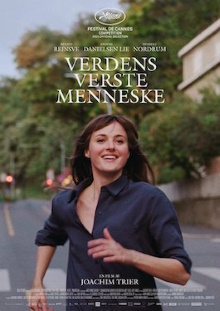So this is certainly an eye-catching title for a film. My contention in this post will be that while the main character may be seen be as a bad person as judged in accordance to conventional values, director Joachim Trier employs the title ironically and tries to portray her in a mostly sympathetic light. As always the mark of an interesting film is how much discussion it engenders and this makes for a wonderful subject of conversation. I’ve never watched any of Trier’s work before this but I believe he is really on to something when it comes to the future of human relationships.
Medical student Julie switches to psychology after claiming that she is more interested in what goes on inside the mind than the body but after a while decides she’s more of an artist and switches again to photography. By the time she meets Aksel Willman, a comic artist, she is experimenting with writing. After spending a night together, Aksel tries to forestall a more serious relationship with her, claiming that as he is 15 years older he wants a long-term partnership and eventually children but she is still too young to settle down. This statement makes Julie fall in love with Aksel and he is overcome by her passion. They move in together and Aksel becomes something of celebrity as his comic book takes off in popularity. As Aksel becomes more busy with events and interviews, Julie seems to become more dissatisfied. One night she wanders off from a party and crashes someone’s wedding reception. There she meets Elvind, a barista, who is also already in a long-term relationship. They are clearly attracted to each other but both say they don’t want to cheat on their partners. Instead they spend the entire night flirting and testing how far one can go without it counting as cheating.
Obviously this synopsis covers only a small part of Julie’s life as shown in the film but the pattern is clear and is explicitly pointed out by other characters and acknowledged by Julie herself. She is flaky and unreliable. She can throw herself wholeheartedly into a subject or a person and after a while she will tire of it and her passions will drive her to something else. Even when she is unable to clearly articulate what it is that she really wants, it doesn’t matter as her feelings hold primacy. She resents Aksel for example for being better at analytically laying out her patterns of behavior and speech because she doesn’t believe that such an approach is inherently superior. Even when Aksel is correct in predicting the future arc of their relationship, she insists on living through it. At the same time, her unrestrained passions, determination to always be true to herself and penchant for spontaneous fun makes her irresistible. The film doesn’t belabor the point, but I think her physical beauty rather matters too and she wouldn’t have been able to get away with nearly as much without it. She hurts people by walking out on relationships seemingly on a whim yet even after being a victim of her vicissitudes, Aksel calls her the great love of his life.
The central challenge of this film therefore is to ask: is Julie a bad person? Contrary to both the title and traditional values, the answer Trier proposes is no and that her lifestyle choices are the new normal. The corollary to not accepting any compromises in one’s quest to seek personal happiness and satisfaction in life is that avoiding any pain and even unpleasantness or tedium is acceptable. Just as medicine has evolved such that physical pain is just another ailment to be medicated away, so people may enter into and exit out of relationships, change jobs and move around whatever makes them happiest. You might argue that people grow through adversity yet surely it should be a personal choice how much adversity one wishes to face. It’s even arguable how much harm Julie is doing to the people around her. Aksel encourages Julie to cut her father out of her life after she realizes that he has an entirely separate family of his own he cares more about. She isn’t deceitful about the type of personality that she has and what she wants out of life. Both of her romantic partners knew what they were getting into and don’t seem to be bitter about breaking up.
I would like to point out that Julie’s lifestyle is only possible because she has the privilege of living in such a rich and developed society. Money is seemingly never a problem for any of these characters while we in poorer countries would be aghast at the colossal waste of just starting a medical degree and then abandoning it. Julie’s father has serious medical problems but it’s not something she has to worry about at all. Elvind is seemingly able to afford a respectably middle-class looking apartment while working as a barista. In the real world, many couples are forced to more or less put up with one another despite their differences because the financial costs of disentangling their lives are just too daunting. In this way, the film serves as a premonition of a more prosperous future where material needs are less of a constraint and people are freer to lead whatever lives might make them happiest.
Personally I need far more stability and predictability in my life than what is shown here but I must still commend Trier for making such a bold and original statement on the human condition. He demonstrates a keen psychological insight in depicting the many social interactions depicted here and lead actress Renate Reinsve too excels in the role of Julie. This is more than just a good film, it’s great art that deserves to be experienced, thought about and discussed.
